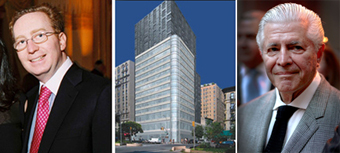
William Friedland, vice president at Friedland Properties, the Melar and Costas Kondylis, founder of Costas Kondylis & Partners
Developer Friedland Properties and architecture firm Costas Kondylis & Partners have finally settled all charges with the federal government relating to the Melar, a rental building at 250 West 93rd Street that came under fire for violations of the federal Fair Housing Act, according to an announcement from U.S. Attorney Preet Bharara’s office.
Negotiations between the developers and federal authorities have been ongoing since last year. The government’s initial complaint, filed in October 2010, alleges that Friedland and Kondylis had failed to create public areas in the building, which is between Broadway and West End Avenue, that were readily accessible to residents with disabilities, as well as set light switches and other outlets in easy to reach locations or provide kitchens and bathrooms that were accessible to disabled persons.
Friedland initially agreed to set aside $180,000 to cover discrimination claims, pay a $40,000 fine and spend $288,300 to remedy the situation. But in April, the landlord filed a motion seeking to withdraw from the settlement.
According to the terms of the final settlement, Friedland will establish a settlement fund of $180,000 to compensate anyone affected by the inaccessibility of features at the 143-unit Melar and pay a civil penalty to the U.S. of $40,000. It will also establish a fund to reconfigure bathrooms, kitchens and closets as necessary to accommodate residents in wheelchairs and pay for its employees to undergo training on the requirements of the Fair Housing Act.
Kondylis & Partners will pay $40,000 as a civil penalty to the United States and pay for its employees to undergo training.
“The Fair Housing Act is an important safeguard for those with disabilities and helps ensure that they can enjoy full use of and access to their living spaces,” Bharara said in the statement. “Architects, owners and developers play a key role in making sure that their requirements are met, and when they fail to do so, this office will hold them accountable.”
The implications of the ruling extend far beyond the Melar and affect some 176,000 apartments, it was reported at the time of the complaint, including at least 64,000 affordable housing units throughout the city. Part of the problem, according to the Real Estate Board of New York, is that a city handicap accessibility law passed in 1987 might not satisfy federal requirements and developers who figured compliance with city law would suffice could be at the mercy of federal regulators. But the U.S. Attorney’s office said that even if such contradictions exist between the city and federal laws, those aren’t relevant to this case.
Friedland and Kondylis were not immediately available for comment.